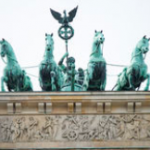By Kevin Judge | June 14, 2018
 Think recovering from the last recession was tough? Imagine yourself in Germany after World War II!
Think recovering from the last recession was tough? Imagine yourself in Germany after World War II!
The country lay in ruins with 5 million military and civilian dead. The great German industrial infrastructure, once the envy of the world, was devastated by allied bombing. The country was divided into two halves, east was controlled by the Soviet Union and the west further divided up into zones run the US, Britain and France.
Fortunately, the Allies resisted temptations to punish and dismantle their conquered foe and chose in 1949 to establish a sovereign state, The Federal Republic of Germany (aka West Germany). It survived and prospered until reunification in 1990 with East Germany, newly liberated by the end of the Cold War competition between the Free West and the Communist East.

During the second half of the 20th century, the best way to illustrate the stakes involved in the Cold War competition was to point to the stark contrast between the two Germanies. The West free and prosperous with the East oppressed and impoverished.
The revival of West Germany was stunningly rapid, hailed as the German Wirtschaftswunder (Economic Miracle). The generous American aid plan, the Marshall Plan, and first leader of the FRG Konrad Adenauer are usually given the credit and for good reason. America resisted the temptation to repeat the mistake of the punitive approach taken after the first World War, and Adenauer led his people out of the darkness of Nazism and totalitarianism by embracing Democracy and a free market economy.
However, a somewhat lesser known figure made critical economic decisions that made all the difference in the world. Ludwig Erhard was a German politician and economist who rejected Nazism and supported the resistance. Despite being explicitly forbidden by the Nazi leadership, he planned for the post war reconstruction with the very dangerous assumption that the war would be lost.
When he was appointed to lead the Economic Council of the Anglo-American zone inn 1947, it was an historic instance of the right man at the right time. He was prepared with a plan for recovery and was determined not to go down the road of centralized planning that was becoming increasingly popular in both the East and West.

Germany and much of the Capitalist world had adopted wage and price controls as a temporary measure to maintain stability during the War years. A truism in life is that there is nothing more permanent than a temporary fix. 73 years after the end of hostilities, New York City still has the rent control instituted during the great war.
Unfortunately, he was ordered not to make changes to the prices controls in place. Erhard bravely proceeded anyway arguing that his orders did not say anything about eliminating them completely! Between June and August of 1948, Erhard decontrolled the prices of produce and most manufactured goods. For most other price ceiling he simply ceased enforcement
Critically, he also reformed the currency. He dramatically reduced the amount of currency in circulation replacing the Reichsmark with the new Deutschemark. A strong currency and price stability was essential to establishing an environment where business and investment could thrive.
Contrary to conventional wisdom of the time, it only took few months for prices to stabilize and the free market system to reemerge. Shortages and reliance on bartering and the black market came to an end. Importantly, these policies avoided the tragedy of runaway inflation that brought down the Weimar Republic.
Erhard followed his early steps with 33 percent tax cut and sweeping deregulating. The was me with string opposition from socialists and communists, but the American Command General Lucius Clay stood behind him. The positive results soon became impossible to deny. Industrial production in 1948 was up over 60% over the prior year.
Upon the formation of the FRG, became the Minister of Economics and held that post until 1963, when he succeeded Adenaer as Prime Minister. Erhard promoted what was referred to as a “social market economy”, that emphasized achieving prosperity through a robust free market economy, a strong central back and a social safety net to protect the disadvantage.
His vision was not fully realized. Germany opted for a more robust welfare state. Ironically, it would not have been possible and survived without the robust economy to pay for it provided by Erhard’s wise policies.
German Miracle?
More like the results of sound free market economics that work whenever and whereever they are tried!
